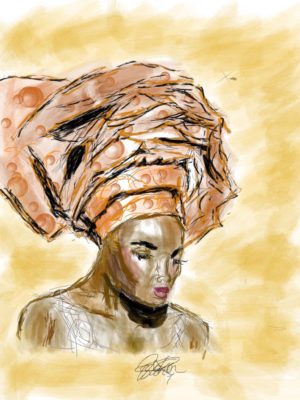Afro Jigidi, the mad man on Third Street, had been there for what seemed like forever, with his red eyes and long hair growing upwards, beard thick and growing in patches, moving about in his tattered clothes and sometimes in abject nudity.
The man’s name and origin was a mystery, and to each person you asked, there was always a different story.
If you went to Mama Eseosa, the oldest woman selling stockfish near Third Street, she would say that he was once a big man passing by the street until he stopped in his tracks and started scratching himself, like someone suffering from ringworm, until he pulled off all his clothes and succumbed to the madness.
Another could tell you that he was a stupid man, regularly visiting the beer parlor with his friends and betting on football matches till he lost all his money and became crazy, a result of poverty. Some others would gist of him being a village boy who came to the city and could not cope, while his family were in the village wondering when he would visit.
To all, he was a Character—disgraceful or amusing—and everyone within that area knew him. Naughty children came to tease the man when they had the chance, for the purpose of amusing themselves.
“Afro Jigidi, what are you eating? Let us join you.” The children repeated this like it was a song, each time doing the best to hide their snickers. Depending on the day, you could see him chewing rotten food with a smile on his face or trying to gnaw on a beer bottle.
“It is rice and chicken! The meat is tough.” The children would scatter afterwards, bellies bursting in laughter.
He was the perfect entertainer; when the day went slowly, they watched him, waiting for the comic relief he would provide, be it dancing to the sound of his own music or chasing the animals that came near his path.
There was a time when he was chased away from the street because of the smell that followed him, better described as the pungent odor of a million toilet flies perching on the body of a corpse which had fallen inside a pit toilet that people still came to defecate in. They noticed, however, that the street was dull afterwards and the customers reduced when they did not see him.
He came back later after taking a bath in the river, which only made the smell damper, but they did not complain, as they were probably still sober from what had been the worst market week in recent years. In time their noses adjusted, as if having been blocked by everlasting cold, and they didn’t smell anything again, but occasionally a new person passed and their face twisted into horror when they passed by Afro. Those people were never regular customers.
One summer, Mrs. Uti, a teacher from the private school at the end of the street, brought Jigidi a nice pack of jollof rice, with two pieces of chicken. When he saw it, his eyes lit up and he devoured it, using his hands to scoop the rice in his hands and pack it in his mouth till his cheeks were fat balloon balls and he swallowed everything at once. The woman laughed and she walked away, feeling good about herself. She moved away two years later– after her father died, she went to take care of her mother.
Time went passing by and Mama Eseosa’s granddaughter started helping the woman in her store. The girl was a fine woman and she made sales increase, but her joy could not be found and she was not amused by Jigidi’s antics. The day that Jigidi tried to steal an apple from the stall nearby, she had been the first and only person to spot him, for a crime he had almost gotten away with. She called all the women and men around who tried to beat him, but Jigidi chased them around, the sharp edges of a broken bottle his weapon, laughing like a hyena. He was chased out of Third Street after that and the man walked around the street, finding himself in new places every day.
The people were not as kind in the other areas as the one in his street were.
It was possible that he had moved around so much of the city, but he found his place: a large, crowded road with smelly bodies slamming into each other, the music high and everyone yelling at the top of their voices. The garbage was thrown about lazily in piles till they had become a fertile breeding ground for rat and fly babies. The gutters were flooded with thick green water while mosquitoes swam and played.
It was the perfect spot for him because nobody smelled him amongst the dirty roads. There was lots of rice—as he called it—for the Jigidi man too and he ate so many scraps of rubbish that his belly became a bit bigger, though he could not keep it down, vomiting a lot of it into the gutters. The people there did not appreciate his entertainment and he never got too close to the stalls because the people there pursued him away. He stayed there, unnoticed for another couple of years, returning to Third Street, as he had done ten years before and ten years before that, in his never-ending, torturous cycle of immortality, and settled there once more, as he would continue to do forever.
**************
Post image by Lidudumalingani via Instagram
About the Author:
 Osahon Ize-Iyamu is a writer of speculative and literary fiction. He lives in Nigeria, where he is hard at work on his first novel.
Osahon Ize-Iyamu is a writer of speculative and literary fiction. He lives in Nigeria, where he is hard at work on his first novel.










Seun Ogunbiyi January 11, 2017 13:12
An important beautiful story. This story has definitely drawn us to the plight of demented people in our society. There has to be discussions around how we should rehabilitate them. unfortunately, African societies often see demented people as victims of spirit manipulation.